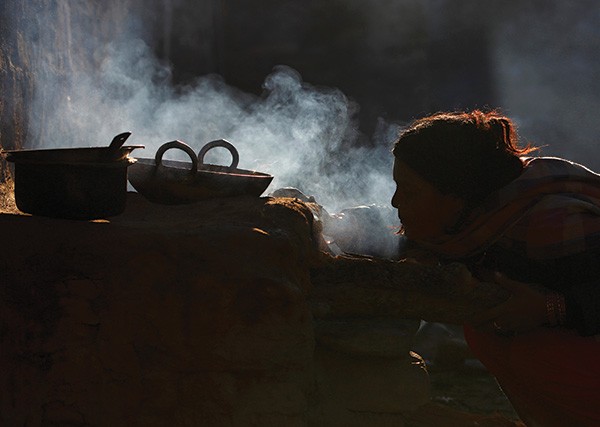According to the World Health Organization, an estimated seven million people were killed in 2012 by the world's largest environmental risk: air pollution. WHO noted that half of air pollution deaths are caused by household stoves. Ovens can contribute to heart disease, stroke, lung cancer, and respiratory infections due to burning the three most polluting fuels on Earth: wood, dung, and crop residues. The shift to cleaner and more efficient energy products like solar and electric stoves has made little progress. The high cost of energy-efficient cooking devices make people reluctant to make the switch; many also rely on their gas stoves to heat their homes. Catlin Powers, an environmental health researcher at Harvard specializing in air pollution, reveals, "No matter how much you improve biomass stoves, you can have some health benefits but you can't meet health targets."
Source: NPR
While most regions urge residents to "buy local" more often, local retailers in the Hudson Valley circulate four times more money to our economy than corporate chains. A new study, "Indie Impact Study Series 2013-14: A National Survey" from Civic Economists, calculated the amount of revenue returned to the local economy by locally owned businesses in Dutchess, Orange, and Ulster Counties, as compared to competing corporations. Hudson Valley restaurants make 2.5 times more money than food chains. Civic economists have been studying these businesses for over a decade and have found that locally generated revenues benefit our community by creating more money to go toward job openings, increased tax revenues for local governments, more investment in commercial and residential districts, and enhanced support for local nonprofits. An additional shift of spending just 10 percent more on local businesses overall would keep an additional $475 million in our regional economy each year.
Source: Re>Think Local
A recent 11-page report by the United Nations has widely criticized the US's human rights record. Target issues include torture methods, drone strikes, the function of the NSA, and the failure to close Guantánamo Bay. The report committee, chaired by British law professor Sir Nigel Rodley, focused on issues such as mass surveillance. The report also points out that all investigations into enforced disappearances and incidents of torture conducted under the CIA's rendition program were closed in 2012, and still remain secret. Related criticism followed for not prosecuting senior members of the armed forces and private contractors involved in torturing and targeted killings—the UN urges the American government to fully investigate crimes such as these, especially when people in command positions are involved. The subject of drone strikes, identified as self-defense by the US in conflicts with al-Qaida and the Taliban, were said to be "too broad" to justify targeted killings. The UN also urged the US to speed up transfer and trial of detainees, many of whom have been held in Guantánamo or military prisons in Afghanistan for longer than a decade.
Source: Guardian (UK)
In April, the Supreme Court ruled to abolish limits on the total amount individuals can contribute to candidates. In a 5-4 split with conservatives in the majority, the court upheld the 2010 Citizens United decision that abolished independent corporation and union campaign limits on spending. Many believe that campaign funding limits are a violation of First Amendment rights; Chief Justice John G. Roberts Jr. wrote on the matter, "There is no right in our democracy more basic than the right to participate in electing our political leaders." The decision will undoubtedly increase overall campaign spending, though it may push more money away from super PACs (organizations that pool campaign contributions to campaign for or against candidates) and toward candidates and parties.
Source: New York Times
California's cruelty to mentally unstable prisoners has been revealed to the public. A series of videos was released in which prison guards filled cells with pepper spray and threw chemical grenades toward inmates. A federal judge ruled that these actions are cruel and unusual punishment. Mentally ill inmates were also shown in isolation, which District Court Judge Lawrence Karlton in Sacramento stated "can cause ill inmates psychological harm and increase their risk of suicide." Adding to the many charges California's prison system has racked up in the past 24 years, Karlton instructed the corrections department to update its policies on isolation and pepper spray within 60 days.
Source: Time
In the past five years, the rate of deportations has decreased by 43 percent, according to recently released Justice Department statistics. Though immigrant advocates have accused President Obama of striving toward a two million deportation goal, the statistics prove otherwise. The steepest drop in deportations occurred in 2011, after the adoption of a policy that led to the deportion of fewer illegal immigrants who had no existing criminal record. Last year, about one-third of cases ruled for keeping foreigners in the US, compared to one-fifth in 2009. Enforcement geography at US borders, however, has increased since 2011, expediting the number of immigrants caught crossing illegally on the spot. Though the number of new deportation cases have dropped, it does not effect the backlog of existing cases in the courts. Judges' efforts have been crippled by budget cuts, leaving them unable to keep up with new cases. Officials at Homeland Security express that these numbers reflect their focus on deporting convicted criminals, foreigners who threaten our nation's security, and recent illegal border crossers.
Source: New York Times
Though many tipplers beamed when hearing powdered alcohol was approved by the federal government in early April, it has since been revealed that the approval was an error. Liquor in a powdered form called "Palcohol," in varieties such as rum and vodka, was said to be accepted by the Alcohol and Tobacco Tax and Trade Bureau. However, a representative of the bureau, Tom Houge, stated in an e-mail to the Associated Press that the approvals were issued in error, failing to state how the error occurred. Multiple patents on powdered alcohol products have been issued; the General Foods Corporation reveals the substance is made by absorbing ethanol onto a kind of carbohydrate powder. The founder of Palcohol, Mark Phillips, claims his creation was inspired by being an "active guy" and wanting to enjoy an alcoholic drink on the go, after hiking, biking, or camping.
Source: USA Today
A deadly strain of cholera hit Haiti in 2010 after a massive 7.0 magnitude earthquake struck the island. The United Nations has not addressed whether its peacekeepers brought the disease to the country, but it is now working toward treatment for Haitians, despite having raised only one-fourth of the $38 million needed last year to offer supplies and water purification systems. Many treatment centers have closed down: 120 centers have been reduced to barely 40. Haiti has had the most cholera cases in the world for three years in a row. Less than two-thirds of the population can access clean drinking water. Vaccinations of the 600,000 vulnerable Haitians require $5 million, which the UN does not yet have. The UN also promised to raise $2 billion from rich countries to build Haiti a water and sanitation infrastructure, which would contribute to ridding the country of deadly cholera. Since the October 2010 outbreak, 8,562 Haitian citizens have died of the disease.
Source: New York Times

















